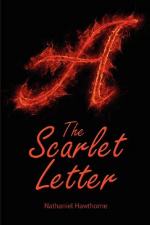The young minister, on ceasing to speak had withdrawn a few steps from the group, and stood with his face partially concealed in the heavy folds of the window-curtain; while the shadow of his figure, which the sunlight cast upon the floor, was tremulous with the vehemence of his appeal. Pearl, that wild and flighty little elf stole softly towards him, and taking his hand in the grasp of both her own, laid her cheek against it; a caress so tender, and withal so unobtrusive, that her mother, who was looking on, asked herself—“Is that my Pearl?” Yet she knew that there was love in the child’s heart, although it mostly revealed itself in passion, and hardly twice in her lifetime had been softened by such gentleness as now. The minister—for, save the long-sought regards of woman, nothing is sweeter than these marks of childish preference, accorded spontaneously by a spiritual instinct, and therefore seeming to imply in us something truly worthy to be loved—the minister looked round, laid his hand on the child’s head, hesitated an instant, and then kissed her brow. Little Pearl’s unwonted mood of sentiment lasted no longer; she laughed, and went capering down the hall so airily, that old Mr. Wilson raised a question whether even her tiptoes touched the floor.
“The little baggage hath witchcraft in her, I profess,” said he to Mr. Dimmesdale. “She needs no old woman’s broomstick to fly withal!”
“A strange child!” remarked old Roger Chillingworth. “It is easy to see the mother’s part in her. Would it be beyond a philosopher’s research, think ye, gentlemen, to analyse that child’s nature, and, from it make a mould, to give a shrewd guess at the father?”
“Nay; it would be sinful, in such a question, to follow the clue of profane philosophy,” said Mr. Wilson. “Better to fast and pray upon it; and still better, it may be, to leave the mystery as we find it, unless Providence reveal it of its own accord. Thereby, every good Christian man hath a title to show a father’s kindness towards the poor, deserted babe.”
The affair being so satisfactorily concluded, Hester Prynne, with Pearl, departed from the house. As they descended the steps, it is averred that the lattice of a chamber-window was thrown open, and forth into the sunny day was thrust the face of Mistress Hibbins, Governor Bellingham’s bitter-tempered sister, and the same who, a few years later, was executed as a witch.
“Hist, hist!” said she, while her ill-omened physiognomy seemed to cast a shadow over the cheerful newness of the house. “Wilt thou go with us to-night? There will be a merry company in the forest; and I well-nigh promised the Black Man that comely Hester Prynne should make one.”
“Make my excuse to him, so please you!” answered Hester, with a triumphant smile. “I must tarry at home, and keep watch over my little Pearl. Had they taken her from me, I would willingly have gone with thee into the forest, and signed my name in the Black Man’s book too, and that with mine own blood!”




